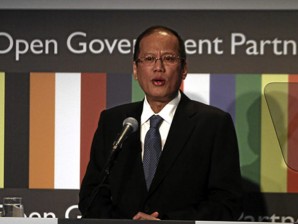NEW YORK—Filipinos should not forget martial law lest they repeat the mistake of one of the darkest periods in their lives, according to President Benigno Aquino III.
During a coffee break with Filipino reporters covering his US trip, the President was asked whether the people should forget or continue to remember how the late dictator Ferdinand Marcos imposed martial law 39 years ago on Tuesday (Wednesday in Manila).
He replied by quoting the writer George Santayana: “Those who forget the mistakes of the past are condemned to repeat them.”
“If we don’t remember, maybe one day, given the right conditions, we just might get into that kind of situation and there will be no certainty that it will be peacefully resolved,” he said.
Conditioning
Mr. Aquino said the people should not forget how they were “conditioned” by the Marcos dictatorship to think that the nation then was in chaos and that martial law needed to be imposed.
He said it should be remembered that “the desire of one man and a group decided for the people then, and until now the people continue to suffer from the wrong decisions made.”
He cited as example the bad debts incurred by the Marcos regime from building the mothballed Bataan Nuclear Power Plant.
“What should we remember about [martial law]? Whatever those revising history say, let us not forget that the person who implemented it had then finished his term in office as allowed under the Constitution. He was supposed to be a bar topnotcher but he did a lot of things that violated the rights of the people, including trying civilians in military courts,” the President said in an apparent reference to Marcos who had a military court try and sentence to death his late father, former Senator Benigno “Ninoy” Aquino Jr.
The assassination of Ninoy Aquino on his return home in 1983 after three years in exile in the United States sparked the 1986 Edsa People Power Revolution that toppled the Marcos dictatorship and installed his widow, Corazon Aquino, as President.
Human rights policy
In Manila, Malacañang renewed its commitment to uphold human rights in commemoration of the 39th anniversary of the imposition of martial law, but remained unclear on the definition of certain concepts that could lead to the adoption of a compensation bill for victims.
Mr. Aquino’s spokesperson Edwin Lacierda boldly said that there was no political prisoner under the current administration and that extrajudicial killings were being investigated.
“We have made a very strict policy to uphold human rights. In fact, we have extended even to those who do not agree with this administration due process, both substantive and procedural due process,” Lacierda said at Wednesday’s news briefing.
“In fact, that is why it takes us so long to file cases. It’s because we are in strict observance of human rights. We believe in due process and we will continue to uphold due process and human rights in this country,” he said.
Lacierda, however, said more precise definitions remained elusive.
Asked to comment on the human rights situation in the country 39 years after the imposition of martial law, he said: “I think we need a better definition of terms and maybe clearer terms of reference with respect to human rights.”
Terms too broad
“Broad terms” related to the human rights issue are apparently getting in the way of the compensation bill for victims of rights abuse, particularly those under the dictatorship.
“There was a bill that was submitted by the executive branch, prior to the [Legislative-Executive Development and Advisory Council] meeting,” Lacierda said. “Unfortunately, the terms and provisions were so broad that these would not be able to determine how one can be called a human rights victim.”
Mr. Aquino thinks that the compensation bill should be fine-tuned and its provisions made more specific, Lacierda said. He said the bill was still “being worked on.”
Lacierda said violating human rights was not a policy of the administration.
“Proof positive of this is the appointment of Loretta Rosales [as chairman of the Commission on Human Rights], who was herself a victim of torture under the Marcos regime,” he said.
He added that there was no political prisoner under Mr. Aquino’s watch despite demands from the Left that certain prisoners be released because they were “consultants” in the peace negotiations between the government and the communist-led National Democratic Front.
Lacierda also said the administration does not condone extrajudicial killings.
“So far, under this administration, there have been 10 extralegal killings that happened and they are all under investigation. Some of [the cases] have already been filed in court,” he said.
Philippines Government

No comments:
Post a Comment